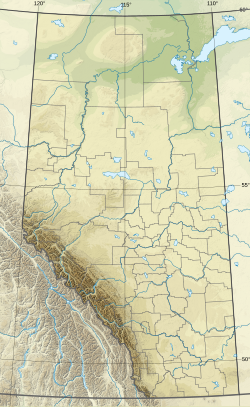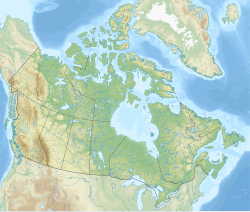Shaftesbury Settlement is an unincorporated community in Alberta, Canada within the Municipal District of Peace No. 135 that is recognized as a designated place by Statistics Canada.[2] It is located on the southeast side of Highway 684, 4 km (2.5 mi) south of Highway 2. It is adjacent to the Town of Peace River to the north on the west shore of the Peace River.
Shaftsbury Settlement | |
|---|---|
| Coordinates: 56°09′14″N 117°27′25″W / 56.154°N 117.457°W | |
| Country | Canada |
| Province | Alberta |
| Region | Northern Alberta |
| Census division | 19 |
| Municipal district | Municipal District of Peace No. 135 |
| Government | |
| • Type | Unincorporated |
| • Governing body | Municipal District of Peace No. 135 Council |
| Area (2021)[1] | |
| • Land | 21.82 km2 (8.42 sq mi) |
| Population (2021)[1] | |
| • Total | 182 |
| • Density | 8.3/km2 (21/sq mi) |
| Time zone | UTC−07:00 (MST) |
| • Summer (DST) | UTC−06:00 (MDT) |
| Area code(s) | 780, 587, 825 |
The Shaftesbury Formation, a stratigraphic unit of the Western Canadian Sedimentary Basin was named for the settlement.[3]
The community was named after Anthony Ashley-Cooper, 7th Earl of Shaftesbury. It was founded by Rev. John Gough Brick from Upton-upon-Severn, Worcestershire, in 1888 as an Anglican mission.[4]
A telegraph line was extended from Edmonton to Shaftesbury in 1910 or 1911. This accommodated telephone communication as well and provided the first rapid means of news and communication for the area.[5]
Demographics
editIn the 2021 Census of Population conducted by Statistics Canada, Shaftesbury Settlement had a population of 182 living in 16 of its 22 total private dwellings, a change of -37.5% from its 2016 population of 291. With a land area of 21.82 km2 (8.42 sq mi), it had a population density of 8.3/km2 (21.6/sq mi) in 2021.[1]
As a designated place in the 2016 Census of Population conducted by Statistics Canada, Shaftsbury Settlement had a population of 71 living in 30 of its 31 total private dwellings, a change of 42% from its 2011 population of 50. With a land area of 4.17 km2 (1.61 sq mi), it had a population density of 17.0/km2 (44.1/sq mi) in 2016.[6]
See also
editReferences
edit- ^ a b c "Population and dwelling counts: Canada and designated places". Statistics Canada. February 9, 2022. Retrieved February 10, 2022.
- ^ Statistics Canada (November 5, 2008). "Population and dwelling counts, for Canada, provinces and territories, and designated places, 2006 and 2001 censuses - 100% data (Alberta)". Retrieved October 17, 2010.
- ^ Lexicon of Canadian Geologic Units. "Shaftesbury Formation". Retrieved February 11, 2009.
- ^ Edmonton Bulletin, September 15, 1888
- ^ Edmonton Bulletin, October 13, 1910
- ^ "Population and dwelling counts, for Canada, provinces and territories, and designated places, 2016 and 2011 censuses – 100% data (Alberta)". Statistics Canada. February 8, 2017. Retrieved February 13, 2017.

